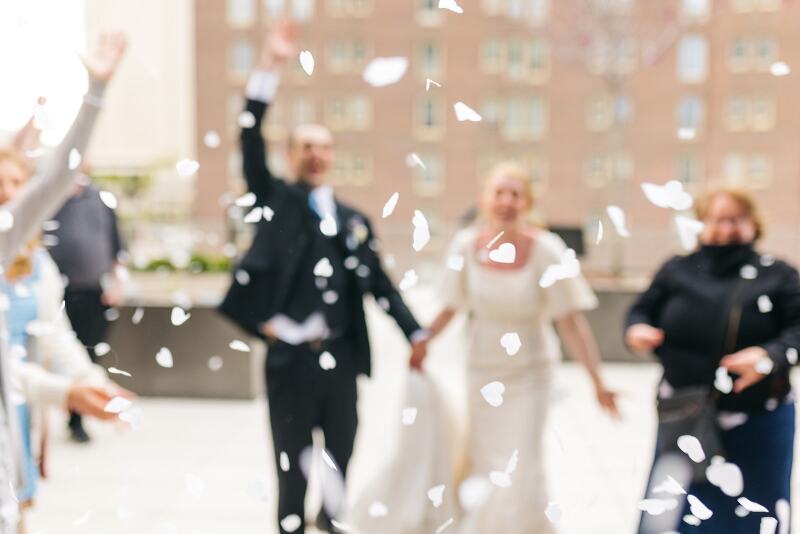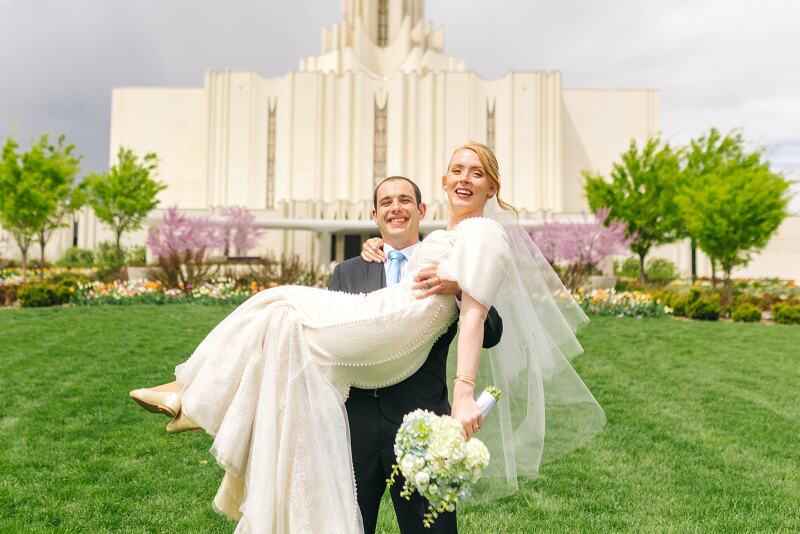What I’m about to say is going to sound cliché—but stay with me. On May 5, 2023, I married Adam Linder in the Jordan River Temple, and it was the dreamiest day of my life. All day long I swear I could look up and just feel heaven smiling. From the moment I woke up at five o'clock in the morning (which was way earlier than necessary, but who wants to sleep in on the most exciting day of your life?), I felt this wonderfully joyful glow that everything was right in the world. Everything was exactly as it should be. Our temple sealing was one of the most spiritual, peaceful experiences I’ve ever had in my life—I felt like the Savior was there smiling as big and unstoppably as Adam and I were the whole time.
Everything about the day was so calming, beautiful, and smiley that I’ve been anxious to never let that sunshine feeling slip away or become a faded memory. When Adam and I are 85, I want to be the type of couple that looks back on their wedding day and lovingly laughs that they thought they were so in love that day, not realizing how much deeper love become over a lifetime. But how do you do that? There seem to be a million things to learn about having a happy marriage—there are hundreds of books to read, podcasts to listen to, classes to take, or workshops to attend. How and when am I supposed to take all of that in? Where do I even start? Can I even be any good at this?
Well, in my sometimes overly anxious search for advice on how to build a happy marriage, one simple sentence has stood out above the rest, and it has brought me that glowing feeling of peace I had on May 5th. As I share what I learned, I hope all the other brides and grooms who read this—whether newlywed or not-so-newlywed—can find some peace too.
Lessons from a Fork
Elder F. Burton Howard of the Seventy gave a talk titled “Eternal Marriage” at the April 2003 general conference. I would have been just five years old at the time and most definitely wasn’t listening then, but now as a 25-year-old newlywed, my ears and heart are wide open. I am listening now.
I actually came across Elder Howard’s talk years before my wedding day in an institute class. But in all the happy marriage research I’ve done since that class, a simple line from his message always comes back to me. The line is this: “If you want something to last forever, you treat it differently.” I love that sentence so much that for my wedding I asked a friend to design the phrase and then I printed it on a little card. I put that card in a gold frame and used it as part of the decorations at our wedding luncheon.

In his talk, Elder Howard tells us how in the early years of their marriage, his wife would carefully save money whenever she could in order to buy fine silverware. She bought just a fork or a spoon at a time, and it took several years until she had enough to serve four people. Elder Howard explains how his wife always meticulously took good care of each of her silver pieces. They were only used on very special occasions; the silverware never left the house for picnics or other events where it could be at risk of getting lost. Each piece was carefully wrapped in a tarnish-free cloth and stowed under the bed where Sister Howard felt it would be the safest. And if any stain or tarnish appeared on the silverware, it was quickly removed with polish. Later in life, when the Howards went on a mission, his wife arranged for the silverware to be stored in a safe-deposit box. “She didn’t want to take it with us. She didn’t want to leave it behind. And she didn’t want to lose it,” Elder Howard said. Then, he ends his talk with these moving words:
“For years I thought she was just a little bit eccentric, and then one day I realized that she had known for a long time something that I was just beginning to understand. If you want something to last forever, you treat it differently. You shield it and protect it. You never abuse it. You don’t expose it to the elements. You don’t make it common or ordinary. If it ever becomes tarnished, you lovingly polish it until it gleams like new. It becomes special because you have made it so, and it grows more beautiful and precious as time goes by.
“Eternal marriage is just like that. We need to treat it just that way. I pray that we may see it for the priceless gift that it is.”
Doesn’t that paint a beautifully simple picture of how to treat your husband or wife? To me, this idea of treating something as a priceless gift that you want to last forever casts a warm glow over life—helping me see how to act and react to the thousands of situations we will face in life. I think Elder Howard’s advice is akin to President Russell M. Nelson’s April 2015 general conference message about how to keep the Sabbath Day Holy. I happened to re-listen to President Nelson’s talk soon after getting married and noticed that so much of what he taught about the Sabbath Day could also apply to marriage. For example, as you read this quote from the talk, think of how his teachings could also apply to keeping a marriage holy:
“In my much younger years, I studied the work of others who had compiled lists of things to do and things not to do on the Sabbath. It wasn’t until later that I learned from the scriptures that my conduct and my attitude on the Sabbath constituted a sign between me and my Heavenly Father. With that understanding, I no longer needed lists of dos and don’ts. When I had to make a decision whether or not an activity was appropriate for the Sabbath, I simply asked myself, ‘What sign do I want to give to God?’ That question made my choices about the Sabbath day crystal clear.”
The simplicity of that advice rings so true to me. Rather than creating long lists of marriage dos and don’ts, I simply ask myself, “What sign do I want to give to God? How do I show Him, Adam, and myself that this is a relationship I want to last forever?” That mindset makes it easier to let little annoyances or disagreements go and find the courage to initiate important conversations or establish healthy habits.
I’m not saying that I don’t plan to keep learning specific skills that will contribute to a strong marriage: I want to take steps to become a better communicator, I want to learn how to better manage finances and run a household effectively, and I want to implement all the other advice loving friends and family wrote on wedding cards. But so far, the most peaceful way I’ve found to do all of that is by keeping Elder Howard’s simple motto in mind: If you want something to last forever, you treat it differently.
Now I want to clarify that I am not under the illusion that I can control every aspect of my happily ever after. I know that Adam and I have many years ahead of us that will bring trials; likely trials that if I knew about now, may make me want to want to crawl into the corner of my closet and stay there. But what is the good in focusing on what could go wrong? I also realize that as a newlywed I am in no way qualified to offer advice. But, again, what is the good in focusing on what I don’t know?
The scriptures teach us to be of “good cheer and do not fear” and that a disciple of Christ “hopeth all things.” So as Elder Quentin L. Cook once counseled, I am going to walk on the sunny side of the street and choose to think, live, and work with the trust that as I consistently treat married life as a priceless gift, it will be polished and shining, ready to withstand whatever may come our way.

▶ You may also like: What I learned about not making deals with God in dating


